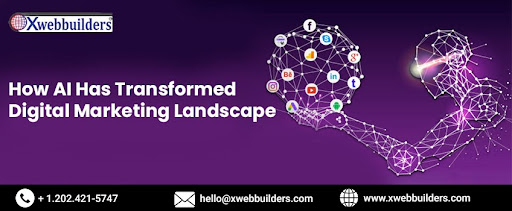
April 20, 2025

Artificial Intelligence (AI) has emerged as a transformative force in various industries, and digital marketing is no exception. AI has revolutionized how businesses reach and engage their target audience, optimize campaigns, and analyze data. By leveraging the power of AI, marketers can unlock new levels of efficiency, personalization, and effectiveness. This article by our best Digital Marketing Company in Ashburn, USA, explores the transformative impact of AI on the digital marketing landscape and the key benefits it brings to businesses of all sizes.
AI (Artificial Intelligence) has revolutionized the digital marketing landscape, empowering businesses to connect with their target audience in more personalized and efficient ways. By leveraging AI technologies, marketers can analyze vast amounts of data, deliver highly targeted campaigns, automate processes, and enhance the overall customer experience. From advanced data analytics and predictive modeling to chatbots and personalized content generation, AI has become an indispensable tool for Digital Marketing services seeking to stay competitive in the digital era.
1) Enhanced Personalization: AI enables marketers to deliver highly personalized experiences to their target audience. AI algorithms can identify patterns, preferences, and behaviors by analyzing vast customer data to create tailored marketing campaigns. AI-powered tools and platforms can automate segmenting audiences, generating personalized content, and delivering targeted messages at the right time, significantly improving customer engagement and conversion rates.
2) Advanced Data Analytics: Data analysis is crucial to digital marketing success. AI algorithms can process and analyze massive datasets much faster and more accurately than humans. Marketers can leverage AI-powered analytics tools to gain deeper insights into customer behavior, purchase patterns, and campaign performance. These insights help make data-driven decisions, optimize marketing strategies, and identify new growth opportunities.
3) Chatbots and Virtual Assistants: AI-powered and virtual assistants have become increasingly popular in digital marketing. These intelligent virtual agents can interact with customers in real time, answer their queries, provide recommendations, and even assist with purchasing. Chatbots save time, improve customer service, and enhance the overall user experience by providing instant and personalized responses.
4) Improved Customer Service: AI has transformed customer service by enabling businesses to provide round-the-clock support. Chatbots can handle routine inquiries, while more complex issues can be escalated to human agents. AI algorithms can also analyze customer sentiment and emotions, allowing businesses to understand customer feedback and sentiment analysis at scale. This information helps marketers tailor their messaging and address customer concerns effectively.
5) Predictive Analytics and Forecasting: AI-powered predictive analytics enables marketers to anticipate customer behavior and make data-driven predictions. AI algorithms can forecast future trends, demand patterns, and customer preferences by analyzing historical data and identifying patterns. Marketers can use these insights to optimize their marketing strategies, forecast sales, and plan targeted campaigns for better results.
6) Content Generation and Optimization: AI has made significant strides in content generation and optimization. Natural Language Processing (NLP) algorithms can analyze vast data to create compelling and relevant content. AI-powered tools can assist in generating blog posts, social media captions, and email marketing campaigns. Additionally, AI algorithms can optimize content for search engines, improving organic search rankings and driving more website traffic.
7) Programmatic Advertising: AI has revolutionized programmatic advertising by automating the buying and selling of ad inventory. AI algorithms analyze user data and behavior to deliver highly targeted ads to the right audience at the right time. Programmatic advertising platforms use AI to optimize campaigns in real-time, ensuring that ads are displayed where they are most likely to generate conversions. This level of automation and optimization increases the efficiency and effectiveness of digital advertising campaigns.
8) Fraud Detection and Security: AI algorithms can detect fraudulent activities in real-time, protecting businesses from click fraud, fake accounts, and malicious activities. AI-powered security systems can analyze user behavior, identify anomalies, and take proactive measures to prevent security breaches. This is particularly crucial in the e-commerce industry, where AI can help prevent fraudulent transactions and protect customer data.
9) Voice Search Optimization: With the rise of virtual assistants like Siri, Alexa, and Google Assistant, voice search has become increasingly popular. AI algorithms optimize content for voice search, ensuring that websites and digital assets are structured to answer voice-based queries effectively. Marketers can adapt their SEO strategies to cater to voice search, increasing visibility and improving user experience.
10) Marketing Automation: AI-powered marketing automation tools streamline repetitive marketing tasks, such as email marketing, social media scheduling, and lead nurturing. These tools can analyze customer behavior, trigger personalized emails based on specific actions, and automate customer segmentation. Marketers can focus on high-level strategy and creative tasks while AI handles the routine aspects of marketing.
AI has not only transformed digital marketing as a standalone field but has also had a significant impact when integrated with other branches of digital marketing. Here are some key pointers highlighting how AI intersects with different branches of digital marketing:
1) Search Engine Optimization (SEO): AI-powered tools can analyze search patterns, user behavior, and keyword trends to optimize website content for search engines. AI algorithms help marketers understand search intent, research keywords, and create SEO-friendly content. Additionally, AI assists in monitoring website performance, identifying technical SEO issues, and suggesting improvements to enhance search rankings.
2) Pay-Per-Click Advertising (PPC): AI algorithms can optimize PPC campaigns by automatically adjusting bidding strategies, targeting specific audience segments, and improving ad placements. AI-powered tools can analyze user behavior, demographic data, and conversion patterns to deliver more relevant ads and maximize ROI. Automated bid management systems can continuously optimize campaigns based on real-time data to improve ad performance.
3) Content Marketing: AI-powered content creation tools leverage natural language processing (NLP) to generate engaging and relevant content. Marketers can use AI to automate content curation, identify trending topics, and personalize content for different audience segments. AI can also analyze content performance, recommend optimization strategies, and predict content virality.
4) Social Media Marketing: AI enables social media marketers to automate tasks such as scheduling posts, monitoring engagements, and analyzing sentiment analysis. AI-powered chatbots and virtual assistants can interact with users in real-time, answer queries, and provide personalized recommendations. AI algorithms can also analyze social media data to identify influencers, track brand sentiment, and optimize advertising campaigns.
5) Email Marketing: AI enhances email marketing by personalizing email content based on user preferences and behavior. AI algorithms can segment audiences, recommend personalized subject lines, and optimize email send times. Additionally, AI-powered tools can analyze email campaign performance, predict user responses, and automate email workflows for better engagement and conversion rates.
6) Customer Relationship Management (CRM): AI-powered CRM systems can analyze customer data, track interactions, and provide valuable insights for personalized marketing campaigns. AI algorithms can identify potential leads, predict customer behavior, and automate lead nurturing. By integrating AI with CRM, businesses can enhance customer experience, improve sales processes, and drive customer loyalty.
In conclusion, AI has transformed the digital marketing landscape in numerous ways, empowering businesses to reach their target audience with greater precision, personalize their messaging, optimize campaigns, and analyze data more efficiently. By leveraging AI technologies, marketers can stay ahead of the competition, deliver exceptional customer experiences, and drive better business results in today's digital age. As AI continues to evolve, its impact on digital marketing will only become more significant, providing marketers with even more powerful tools and capabilities to achieve their goals. For more information or to avail services of our Digital Marketing Company, visit Xwebbuilders.com.